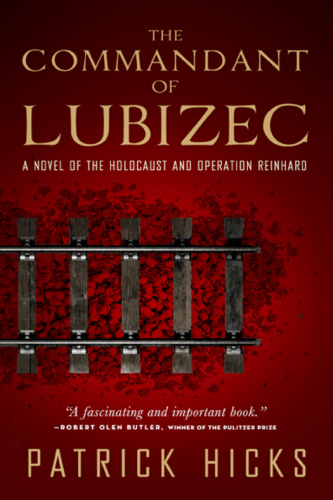
The Commandant of Lubizec
A Novel of The Holocaust and Operation Reinhard
- اطلاعات
- نقد و بررسی
- دیدگاه کاربران
نقد و بررسی

November 4, 2013
Readers who have not read extensively about the Holocaust may be surprised, and perhaps puzzled, to learn at this novel’s end that the Nazi death camp in Poland described in agonizing and moving detail is fictional. For those able to put aside the question of why poet (This London) and debut novelist Hicks made the choice not to describe an actual death camp, his tale will serve as a solid depiction of historical horrors. The eponymous commandant, Hans-Peter Guth, is believably painted with the schizophrenic personality required for a good family man who plays with his children before heading off to work as an architect of genocide. Hicks goes to gruesome lengths to show that those living near such extermination centers knew what was going on, graphically depicting how the windows of surrounding houses were stained by human fat. His methodical style, which mimics an actual history book, down to the inclusion of footnotes, presents the Nazis’ logical approach to mass murder via the accumulation of small but damning details. No one will mistake this for Night or Schindler’s List, but it’s nonetheless a grim eye-opener.

February 1, 2014
A heart-rending novel about a Nazi death camp that didn't exist--but could have. Hans-Peter Guth is a devoted family man, the type who takes his kids camping, gets on the floor to play soldiers with his son and talks to his daughter about the book she's reading. He's also a mass murderer, responsible for the deaths of--by his own estimation--a million Jews. Guth is commandant of the Lubizec death camp in Poland, where trainloads of Jews are unloaded, stripped naked, shaved, then crammed into gas chambers. Of course, Guth himself never lays a finger on anyone--he leaves that to his sadistic guards--but he certainly runs the show, trying every day to mass murder more and more efficiently. Meanwhile, the few that the Nazis keep out of the gas chambers to serve as slave labor eke out a miserable and short existence, treated like animals and devoid of hope. Hicks, author of several poetry collections (Finding the Gossamer, 2009, etc.), tells the story of the fictional Lubizec as if it were a historical account, complete with footnotes and quotes from future fictional documentaries, to devastating effect. Of course, most of the things that happened in Hicks' fictional camp happened in the real death camps, but Hicks' documentary style not only adds a layer of realism to the story, but also allows him to comment on certain inherent problems with books on the subject. For instance, Hicks repeatedly underscores the sad fact that tales of the Holocaust tend to focus disproportionately on the Nazis since they were the ones keeping records and since exponentially more of them survived to tell what happened in the camps. Hicks points out that each and every one of the millions of innocent people who died in the camps are the ones whose stories actually deserve to be told. Hicks' prose is clear and unflinching, and while, as a result, there are many difficult-to-read scenes, this is as it should be. Thought-provoking and gut-wrenchingly powerful.
COPYRIGHT(2014) Kirkus Reviews, ALL RIGHTS RESERVED.

January 1, 2014
Hicks (Finding the Gossamer) offers a novel of the Holocaust imagined at one of the German death camps in Poland overseen by fictional Commandant Hans-Peter Guth. Chapters alternate between the commandant's activities at Lubizec, a fictional creation that is almost an anagram of the actual death camp Belzec, and his home life in a villa near the campsite. Some readers may know that, unlike the concentration camps, the Nazi death camps slotted inmates for immediate extermination. Thus, Lubizec is a factory for instant, industrialized murder. Poet Hicks succeeds by presenting his tale as a blend of documentary and memoir, in which we are let into the thoughts of the commandant, his family, the victims, and the guards. Guth, based on two real-life counterparts (Franz Stangl of Treblinka and Rudolf Hoss of Auschwitz), is a psychological study of loving family man and cold-blooded mass murderer. VERDICT The fictional presentation here measures up to any factual account of the Holocaust this reviewer has ever read. Highly recommended, especially for general readers who wish to know more about this unspeakable chapter of human history. Even specialists will be taken in by its human-interest dimension.--Edward B. Cone, New York
Copyright 2014 Library Journal, LLC Used with permission.




دیدگاه کاربران